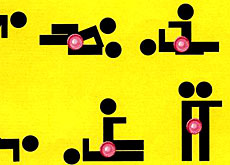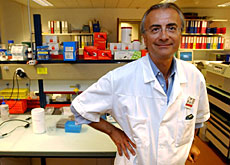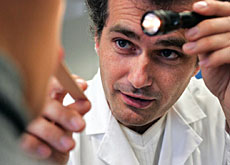Gay groups urge rethink on World Aids Day

Latest figures show that the number of gay men in Switzerland infected with the HIV virus is expected to rise by more than a third this year.
Gay organisations admit there is no “miracle cure” to stem the rising infection rate among homosexuals in Switzerland.
The latest rise in infections among homosexuals announced by the Federal Health Office mirrors a similar increase three years ago. This prompted the government and gay organisations to launch a charter outlining minimum safety standards for gay clubs and saunas, but this has failed to reverse the trend.
“The ideas we put forward in 2002 were great and I was convinced that they would work, but they didn’t,” Moël Volken, director of the gay association Pink Cross, told swissinfo.
“Naturally we need to do something new and focus more on gay people. But exactly what we should do we don’t know, because we don’t know what we did wrong.”
The sharp rise in infections among homosexuals comes as statistics for the overall population show a slight decline for the third year running.
Unprotected sex
Officials fear an increasing tendency among some gay men to engage with multiple partners and in unprotected sex lies behind the surge in new cases.
“With the probability of meeting a partner already infected being 30 to 40 times higher than among the heterosexual population, this phenomenon has far more serious consequences for homosexuals,” warned Roger Staub, head of the Aids section at the Federal Health Office.
According to the Swiss Aids Federation, 20 per cent of gay men practise unprotected sex in risk situations – double the number a decade ago.
This is despite constant work by the Federal Health Office and organisations to promote the safe sex message.
Both the Pink Cross and the Swiss Aids Federation are concerned that they are not getting through to the generation of gay men who have grown up believing Aids is no longer a killer because of the success of antiretroviral drugs.
“Aids has changed its face since 1990 and for them it does not carry the same risk as for my generation. They know it exists, but with all the medication available it is not seen as fatal,” said Volken.
Safe sex
Thomas Lyssy, spokesman for the Swiss Aids Federation, agrees that the disease has lost some of its fear factor and says it is time for a rethink on how to get the safe sex message across.
He believes one option is for health workers to spend more time in the saunas and clubs where gay men meet.
The Federal Health Office announced this week that it plans to target the group as part of a nationwide HIV/Aids awareness campaign to be launched early next year.
The government says it intends to ensure more health advice is available on the internet and in clubs and saunas, especially in Geneva, Lausanne and Zurich.
The Swiss Aids Federation has welcomed the initiative but says a new approach is needed to reach those continuing to ignore the risks of HIV/Aids.
“No one, as far as I know, has the answer to the problem right now. We are all trying to work together in the right direction but the miracle cure in prevention has not been found yet,” Lyssy said.
swissinfo, Adam Beaumont
The number of new HIV infections among gay men is expected to rise by 37% this year to 240 cases.
Among the heterosexual population the number of new HIV infections is predicted to fall by 14% to 375.
The Federal Health Office says one in ten homosexuals is HIV-positive against one in 100 for the heterosexual population.
According to the Swiss Aids Federation, more than 20,000 men and women live with HIV/Aids in Switzerland. Two people are diagnosed HIV-positive every day.
Cash available for HIV/Aids campaigns has almost halved to SFr9 million ($6.9 million) since 2004, according to the Federal Health Office.
The Swiss focused on Africa on World Aids Day.
Parliamentarians, church representatives and non-governmental organisations gathered in Bern on Thursday to hand over a petition calling for more help for Africa.
The petition calls on the government to increase funding for the fight against Aids and for pharmaceutical companies to give up patent protection for their Aids drugs.

In compliance with the JTI standards
More: SWI swissinfo.ch certified by the Journalism Trust Initiative











You can find an overview of ongoing debates with our journalists here . Please join us!
If you want to start a conversation about a topic raised in this article or want to report factual errors, email us at english@swissinfo.ch.